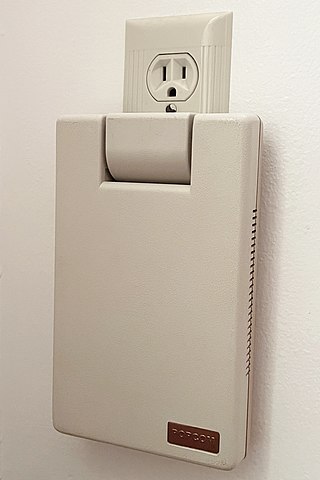Hayes Microcomputer Products was a US-based manufacturer of modems. The company is known for the Smartmodem, which introduced a control language for operating the functions of the modem via the serial interface, in contrast to manual operation with front-panel switches. This smart modem approach dramatically simplified and automated operation. Today almost all modems use a variant of the Hayes command set.

Tecmar Inc. was an American manufacturer of personal computer enhancement products based in Solon, Ohio. The company was founded in 1974 by Martin Alpert, M.D., and Carolyn Alpert. The company's first products were computerized medical equipment; the company shortly after pivoted to data acquisition boards for the first generation of microcomputers. Popular products included the Scientific Solutions LabMaster series of boards for S-100 and Apple Computer.

The PCradio was a notebook computer released by International Business Machines (IBM) in late 1991. Designed primarily for mobile workers such as service technicians, salespersons and public safety workers, the PCradio featured a ruggedized build with no internal hard disk drive and was optioned with either a cellular or ARDIS RF modem, in addition to a standard landline modem.

Canon Computer Systems, Inc. (CCSI), sometimes shortened to Canon Computer, was an American subsidiary of Canon Inc. formed in 1992 to develop and market the parent company's personal computers and workstations. The subsidiary also assumed the responsibility of marketing Canon's printers and photocopiers, which were formerly sold by other Canon divisions. It went defunct in January 2001.

Advanced Logic Research, Inc. (ALR), was an American computer company founded in 1984 in Irvine, California by Gene Lu. The company marketed IBM PC compatibles across that standard's evolution until 1997 when it was acquired by Gateway 2000.
3D Microcomputers Wholesale and Distribution, Inc., often referred to as 3D Microcomputers or 3D Micro, was a computer company based in Markham, Ontario. The company was among the top five personal computer vendors in Canada in the mid-1990s. The company was partially owned by Hong Kong–based computer manufacturer PC Chips for several years; many of the parts for 3D Micro's computers were of overseas origin.

The MacEnhancer is an expansion box originally developed in 1985 by Microsoft for Apple Computer's original Macintosh. Plugged into either the Macintosh's serial printer or modem ports, the MacEnhancer provides IBM-standard printer and serial ports as well as a passthrough for the Mac-standard serial port, for a net gain of three peripheral ports. Along with a provided disk of drivers, this expansion box allows the Macintosh to run a host of printers and other business peripherals not originally supported by Apple.

Cumulus Corporation was an American computer peripheral and system manufacturer active from 1987 to 1993. Based in Beachwood, Ohio and started by Tecmar founder Martin Alpert, the company set out to exclusively manufacture expansion products for IBM's Personal System/2 (PS/2) family of computers—mainly RAM expansion cards. It later released cross-platform CPU upgrade cards and memory expansion cards for other platforms besides the PS/2. Beginning in 1990, the company began trading as Cumulus Computer Corporation and began releasing complete systems of their own. Initially a success story for the tech industry in Cleveland, a botched stock launch in 1992 proved disastrous for the company's ailing cash flow situation, and in 1993 the company was liquidated amid massive debt to suppliers and lenders.

Popcom was a line of modems marketed by the Prentice Corporation of Sunnyvale, California, introduced in 1984. The line comprised six models—X100, X150, C100, C150, C200, C250—the C models being internal modems meant to plug into a free ISA expansion slot of a PC compatible, while the X models were compact external units intended to be plugged into a wall indefinitely and connected to the computer via a serial cable. The X100 and X150 were noted by the press for their very small physical footprint among its contemporaries in the market.
Leading Technology, Inc., was an American computer company based in Beaverton, Oregon, and active from 1985 to 1992. It sold IBM PC–compatible computer systems, monitors, and other peripherals supplied by original equipment manufacturers (OEMs) in Hong Kong, Korea, Taiwan. In 1992, the company was purchased by VTech of Hong Kong.

Cardinal Technologies, Inc., was an American computer company originally based in Lancaster, Pennsylvania, that primarily manufactured modems for personal computers, among other peripherals.

Prometheus Products, Inc. was an American computer peripheral manufacturer active from 1981 to 1996. The company primarily manufactured modems and sound cards for personal computers for the bulk of its existence.

Boca Research, Inc., later Inprimis, Inc., was an American computer company based in Boca Raton, Florida, and active between 1985 and 2002. The company manufactured a variety of expansion cards for the IBM PC and compatible systems, including memory cards, networking cards, sound cards, and graphics cards. Once a major player in the computer networking market, being the fourth-largest manufacturer of modems in 1996, Boca Research abandoned the PC hardware market entirely amid falling market share and manufactured set-top boxes in the last years of its existence.

Reveal Computer Products, Inc., was a short-lived American computer peripheral manufacturer active from 1992 to 1996. It was established as a subsidiary of Packard Bell Electronics, an American computer company. The company was once a major player in the IBM PC peripheral market, with annual sales peaking above the US$200 million mark. It went bankrupt in 1996 after an aborted $65-million merger with Creative Technology.

Future Domain Corporation was a privately held American computer hardware company active from 1982 to 1995 and based in Orange County, California. The company was among the first to produce Small Computer System Interface (SCSI) device controller expansion cards, later controller ICs. It was acquired by Adaptec in 1995 for US$25 million.
New Media Corporation, also known as New Media Technology Corporation, was an American computer company active from 1992 to the early 2000s. The company focused on the design and manufacture of PC Cards, a type of expansion card bus for laptops that had their heyday from the early 1990s to the mid-2000s. New Media was privately held and based out of Irvine, California.
Micronics Computers, Inc. was an American computer company active from 1986 to 1998 that manufactured complete systems, motherboards, and peripherals. Based in the San Francisco Bay Area, Micronics was one of the largest domestic motherboard manufacturers in the United States in the 1990s. After acquiring Orchid Technology in 1994, the company entered the market for multimedia products, such as graphics adapters and sound cards. In 1998, Micronics was acquired by Diamond Multimedia.
Kraft Systems, Inc., was an American electronics company based in San Diego County, California, and active from 1962 to 1994. The company was founded by Philip O. Kraft and began as a manufacturer of transmitters for radio-controlled models, namely RC aircraft. In 1972, the company was acquired by the Carlisle Corporation of Cincinnati, Ohio, who kept Kraft around as a subsidiary still based in San Diego. In the early 1980s, Kraft pivoted to manufacturing joysticks for home and personal computers, becoming a major vendor in this market. Kraft eventually sold off their intellectual property to MicroSpeed, Inc., of Fremont, California, and shortly after went defunct.

Colorado Memory Systems, Inc. (CMS), was an American technology company independently active from 1985 to 1992 and based in Loveland, Colorado. The company primarily manufactured tape drive systems, especially those using quarter-inch cartridges (QIC)s, for personal computers and workstations. Colorado Memory Systems was founded by Bill Beierwaltes as an offshoot of his previous company, Colorado Time Systems, also based in Loveland. It was acquired by Hewlett-Packard in 1992.

Jonos International, Inc., originally Jonos, Ltd. (JL), later Netcom Research, Inc., was an American computer company active from 1980 to 1992. The company sold a variety of computer hardware products and systems, including STD Bus peripherals, smart terminals, microcomputers, and portable computers. The company's Courier portable computer was the first microcomputer sold with Sony's then-new 3.5-inch floppy disk drives on its release in June 1982. Jonos' systems were widely used in the fields of construction, roadworks, machining, and military.














